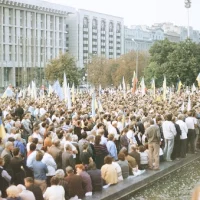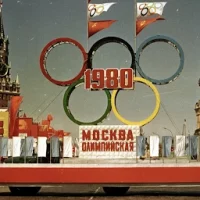Revanchist policies from the Kremlin, crackdowns on protesters – lately with Russia it seems like everything old is new again. So perhaps it’s time to look back at the very embodiment of Cold War tensions – the infamous KGB (Komitet Gosudarstvennoy Bezopasnosti, or Committee of State Security). Rarely violent but often threatening, the constant presence of… Read More "Constant Companions: KGB Stalking of FSOs"
Making the World a Safer Place — Nuclear Arsenals and the Fall of the USSR
Imagine what Europe would be like today if Belarusian strongman Aleksandr Lukashenka were able to threaten his neighbors with nuclear weapons. Or how much tenser the situation in Ukraine would be if Kyiv had access to the bomb — Would Putin grab just Crimea or would he be tempted to take all of Ukraine to… Read More "Making the World a Safer Place — Nuclear Arsenals and the Fall of the USSR"
The Downing of KAL Flight 007
On August 30, 1983, a Boeing 747, Korean Airlines 007 took off for Seoul from New York’s John F. Kennedy International Airport. With 246 passengers and 23 crew on board, the routine yet ill-fated flight would never complete the second leg of its journey from Anchorage to Gimpo Airport. Significantly off course, Captain Chun Byung-In… Read More "The Downing of KAL Flight 007"
“If Putin gets away with Crimea, eastern Ukraine will be next”
The following was written by Victor H. Ashe, Ambassador to Poland under the Bush Administration. He argues that President Obama’s past actions have emboldened Putin to make the moves he has made and that the U.S. needs to show that there will be consequences for such actions. The article was originally published March 14, 2014 by Ambassadors Perspective, the…
“With Ukraine, Russia is an empire. Without it, Russia is just another country.” The history between these two is long and often fraught with conflict. Before the current protests in Ukraine over relations with Russia, Ukraine had to fight to free itself from the Soviet Union. Official independence was declared August 24, 1991 and with… Read More "Ukraine’s Push for Independence"
Transnistria — Moldovan Land Under Russian Control
The Transnistria region in Moldova is a Cold War relic. Along with Nagorno-Karabakh in Armenian-controlled Azerbaijan and South Ossetia in Georgia, it is a post-Soviet “frozen conflict” zone where a situation of “no war, no peace” still persists. It did not want to separate from the USSR when the latter was dissolved; the brief military conflict that started in March 1992… Read More "Transnistria — Moldovan Land Under Russian Control"
Poland’s Path to NATO
The North Atlantic Treaty Organization was created by ten European countries, the U.S. and Canada in 1949 in the aftermath of World War II in order to provide mutual protection in case of an attack against any member. For decades it stood as the bulwark against a possible invasion from the Soviet Union and its allies.… Read More "Poland’s Path to NATO"
The Olympic Games, despite their lofty ideals, have since their inception in ancient Greece intertwined the best of athletic competition with the world of politics. Case in point: The 1980 Summer Games in Moscow, which took place less than a year after the USSR invaded Afghanistan. While there was no way to undo the invasion,… Read More "Moscow Gets Torched — The Boycott of the 1980 Summer Games"
Stranded in the Cold War Siberian Winter
The Intermediate-Range Nuclear Forces Treaty (INF) marked a turning point in relations between the U.S. and the USSR. Signed in December 1987 by President Ronald Reagan and Mikhail Gorbachev, the treaty came into force on June 1, 1988 and was the first treaty to ever destroy nuclear missiles, rather than just cap the number each side could possess. It eliminated intermediate range missiles… Read More "Stranded in the Cold War Siberian Winter"
Georgia: A Place of Ethnic Unrest and Civil Strife
The Caucasus region of the former Soviet Union has experienced several conflicts that have been provoked by ethnic hatred and land disputes. One country, Georgia, finds itself in two different conflicts: one with Abkhazia, the other with South Ossetia. The Georgia-Abkhazia conflict stems from ethnic hatred: in a twist from what often happens in such… Read More "Georgia: A Place of Ethnic Unrest and Civil Strife"


